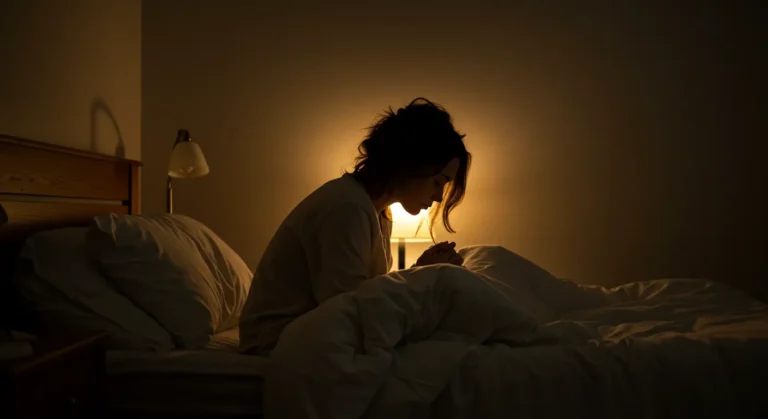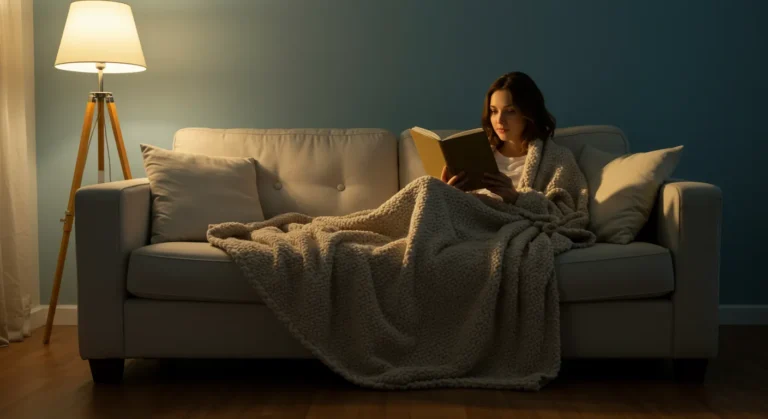Get More Deep Sleep: How to Improve Sleep and Maximize Your REM Cycles

You know that feeling when you sleep for eight hours but wake up like you’ve been hit by a freight train? Meanwhile, your friend bounces out of bed after six hours looking like they just stepped out of a wellness magazine. The difference isn’t luck—it’s deep sleep quality.
Here’s what nobody tells you about get more deep sleep: it’s not about time spent unconscious. It’s about cycling through the right stages at the right intensity. And the holy grail? Deep sleep—where your body literally rebuilds itself while you’re completely checked out.
After years of helping people optimize their rest through simple biohacking principles, I’ve learned that most sleep advice misses the point entirely.
You don’t need to transform your bedroom into a NASA sleep lab. You need to understand what actually drives restorative sleep and work with your biology, not against it.
Let me show you how to get more deep sleep starting tonight.
Why Get More Deep Sleep Is Your Body’s Secret Weapon
Think of sleep like a multi-stage renovation project happening in your body every night. Light sleep is like tidying up. REM sleep handles the mental filing. But deep sleep? That’s when the real construction happens.
During deep sleep phases, your body releases growth hormone, repairs muscle tissue, consolidates memories, and literally cleans toxins from your brain through something called the glymphatic system. It’s like having a full-service repair crew working while you’re completely offline.
Research from the University of California shows that people who get sufficient deep sleep have 40% better immune function and recover from physical stress 60% faster than those who don’t. Your deep sleep percentage directly correlates with how you feel, perform, and age.
But here’s the kicker: you can sleep for nine hours and still wake up exhausted if you’re not cycling through enough deep sleep.
Most adults need about 15-20% of their total sleep time in deep sleep stages. Less than that, and you’re running on fumes no matter how long you stayed in bed.
What’s Actually Sabotaging Your Deep Sleep
Before we fix anything, let’s identify the hidden culprits stealing your restorative sleep. Some of these might surprise you.
Your Evening Routine Is Working Against You That “relaxing” glass of wine? It might help you fall asleep, but alcohol fragments your sleep cycles and reduces deep sleep by up to 39%. Your brain spends the night processing the alcohol instead of doing repair work.
Your Bedroom Is Too Warm Your core body temperature needs to drop 2-3 degrees to trigger deep sleep. If your room is above 68°F, you’re fighting your biology. Cool bedrooms aren’t just comfortable—they’re essential for sleep quality.
You’re Stressed About Sleep Itself Sleep anxiety is real and incredibly common. The more you worry about not sleeping, the more your nervous system stays activated. It’s a vicious cycle that keeps you in lighter sleep stages.
Your Circadian Rhythm Is Confused Getting bright light at night or missing morning sunlight throws off your internal clock. Your body doesn’t know when to produce melatonin or when to start the deep sleep process.
You’re Eating Too Close to Bedtime Digestion and deep sleep compete for your body’s resources. Eating within three hours of bed means your body is processing food instead of focusing on restoration.
The Deep Sleep Optimization Blueprint
Here’s how to systematically improve your deep sleep without turning your life upside down. Start with the basics, then layer in additional strategies.
Master Your Sleep Schedule First Your body loves predictability. Going to bed and waking up at consistent times—even on weekends—strengthens your circadian rhythm and makes deep sleep more accessible.
Pick a bedtime that allows for 7-9 hours of sleep, then stick to it religiously for two weeks. Your body will start preparing for deep sleep automatically once it trusts the schedule.
Create a Temperature Drop About 90 minutes before bed, take a warm shower or bath, then step into a cool bedroom. This temperature shift mimics your body’s natural deep sleep trigger.
Keep your bedroom between 65-68°F. Use breathable bedding and consider a cooling mattress pad if you run hot.
Build a Nervous System Wind-Down Your body can’t flip from high-stress to deep sleep instantly. Create a transition ritual that signals safety and rest to your nervous system.
Try this sequence: dim lights, practice breathing exercises for sleep (like the 4-7-8 technique), do gentle yoga poses for sleep, or listen to deep sleep music. The key is consistency—use the same routine every night.
Optimize Your Light Exposure Get bright light within 30 minutes of waking to set your circadian clock. In the evening, use warm, dim lighting and avoid screens for at least an hour before bed.
Blue light blockers can help if you must use devices, but nothing beats simply powering down early.
Natural Tools That Actually Move the Needle
Once you have the basics dialed in, these natural sleep aids can enhance your deep sleep quality significantly.
Essential Oils for Deep Sleep Lavender oil for sleep isn’t just pleasant—it’s clinically proven to increase deep sleep percentages. Diffuse it 30 minutes before bed or apply diluted oil to your wrists.
Try blending lavender with vetiver and roman chamomile for an even more powerful sleep essential oil blend. Use a sleep diffuser with a timer so you’re not breathing oils all night.
Herbs That Support Deep Sleep Magnesium glycinate taken 90 minutes before bed helps your muscles relax and supports natural melatonin production. Start with 200-400mg.
Ashwagandha reduces cortisol levels that interfere with deep sleep. L-theanine promotes relaxation without drowsiness, making it easier to transition into deeper sleep stages.
Passionflower and valerian root are traditional herbs for sleep that can be particularly helpful if racing thoughts keep you in lighter sleep.
Sound and Vibration White noise or brown noise can mask disruptive sounds and help maintain consistent sleep stages. Some people find binaural beats for sleep helpful, particularly those designed for delta brain waves.
Weighted blankets provide gentle pressure that can increase serotonin and help you stay in deeper sleep longer.
The Deep Sleep Tracking Reality Check
Here’s something important: you don’t need expensive sleep tracking devices to improve deep sleep, but basic awareness helps tremendously.
Simple indicators of better deep sleep include waking up naturally without an alarm, feeling refreshed within 15 minutes of waking, having stable energy throughout the day, and remembering fewer dreams (you dream less in deep sleep).
If you do use a tracker, focus on trends over individual nights. Deep sleep percentages naturally vary, but you should see improvements over weeks, not days.
Troubleshooting Common Deep Sleep Issues
If you fall asleep easily but wake up tired: Focus on sleep environment and evening routine. You might be getting fragmented sleep that prevents deep phases.
If you can’t fall asleep: Work on nervous system regulation and circadian rhythm consistency. Try progressive muscle relaxation or meditation before bed.
If you wake up frequently: Check your bedroom temperature, caffeine timing, and stress levels. Consider natural sleep remedies like magnesium or chamomile tea.
If you feel tired despite “enough” sleep: You might need to prioritize sleep quality over quantity. Focus on the deep sleep strategies above rather than just spending more time in bed.
Making It Sustainable
The biggest mistake people make is trying to improve deep sleep and optimize everything at once, burning out, and going back to old habits. Instead, pick one or two strategies and stick with them for at least two weeks before adding more.
Maybe you start with a consistent bedtime and cooler bedroom temperature. Once those feel automatic, add a simple before sleep routine with some gentle stretching and essential oils for sleep and anxiety.
The goal isn’t perfection—it’s progress. Small, consistent improvements in deep sleep quality compound over time into dramatic changes in how you feel and function.
Your body wants to give you restorative sleep. Most of the time, we just need to get out of its way and create the right conditions for deep rest and get more deep sleep to happen naturally.
Want more practical wellness tips and guides? Check out our latest articles, and If you’re curious about how a good night’s rest can truly make a difference, you might enjoy exploring our Ultimate Guide to Deep Sleep.
Disclaimer: The information provided is for educational purposes only, not a substitute for professional medical advice. Always consult a healthcare professional.







